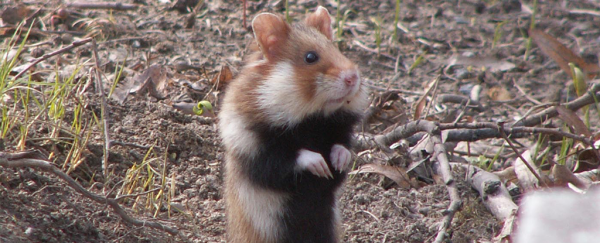Fed little else but corn every day, even the meekest of us would go a little bonkers. But for wild European hamster mothers, malnutrition caused by a diet consisting largely of corn is turning them into cannibals, according to new research.
Scientists have found that endangered female hamsters fed a diet of just corn are far more likely to eat their babies than hamsters fed a balanced diet of wheat, clover, and meal worms. And it's part of a much bigger problem in agriculture.
Modern agriculture relies heavily on planting just one species of crop over a wide area, rather than mixing them up. These concentrated 'monocultures' might make things easier for us, but there have long been fears that they do little good for the local ecosystem.
Last year, a report published in Nature by the Intergovernmental Science-Policy Platform on Biodiversity and Ecosystem Services expressed concern over the role monocultures play in reducing the numbers of pollinators.
But there's been little research done into the effect these monocultures might be having on local mammals, such as wild European hamsters, which are considered critically endangered across many Western European countries.
"More generally, all species with small home ranges that live in agricultural landscapes appear to be constrained in their diet by thousands of hectares dominated by one or two intensively cultivated crops," report the researchers.
To figure out whether being exposed to so much corn could be bad for local hamster populations, the researchers set up a series of experiments where they fed groups of European hamsters a diet of wheat or corn, with a side of clover or worms.
There was little difference in the fundamental energy value of their meals, and both groups produced the same sized litters.
Yet where 80 percent of the litters from those on the wheat diet survived, only five percent of the litters produced by mothers raised on corn lived past weaning. It turns out the corn-raised mothers weren't feeling very motherly.
"In contrast, most of the mothers in the group fed the maize-clover diet did not display maternal behaviour: they did not gave birth in the nest (pups were spread out in the cage) and then placed their pups on top of their hoard of maize grains before eating them," the researchers write in Proceedings of the Royal Society B.
They also displayed other strange behavioural signs, running in circles and "climbing and pounding their feeders".
What was most alarming was the way they killed their pups. "Females stored their pups with their hoards of maize before eating them," the scientists reported. "Pups were still alive at that time."
The females also had swollen and dark tongues, and such thick blood it was difficult for the researchers to draw samples.
All of these symptoms are similar to signs of vitamin B3 deficiency, which causes a condition called pellagra in humans, that's been linked to diarrhoea, dementia, and strange behavioural changes.
"Improperly cooked maize-based diets have been associated with higher rates of homicide, suicide and cannibalism in humans," the researchers explain.
In fact, pellagra is thought to have contributed to the deaths of around 3 million people in North American and Europe from the mid-18th to the mid-20th century.
To test whether this was the same thing that was happening to the hamsters, the team added B3 back into the corn-dominated diet.
That small change was enough to reverse the behavioural symptoms, and stop them eating their young, suggesting that the lack of B3 in a corn-dominated diet was somehow changing the animals' nervous system in a similar way that it does in humans.
Given the rough ride wild hamsters have had in the past, this new research isn't good news. In 2011, France was rapped over the knuckles with threats of a 23 million euro (US$24.6 million) fine for not taking better care of their puffy-cheeked charges as numbers dwindled.
"Knowing that these species already face many threats, and that most of them are in danger of extinction, it is urgent to restore a diverse range of plants in agriculture schemes," the researchers write.
Biodiversity isn't just about keeping natural ecosystems in good health, but using our knowledge to produce rich managed ecosystems as well. If the bees don't thank you for it, the baby hamsters will!
This research was published in Proceedings of the Royal Society B.
